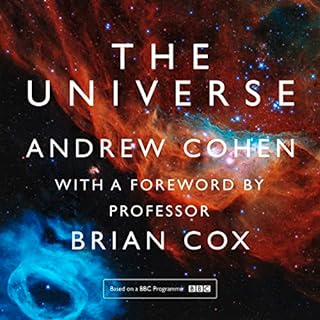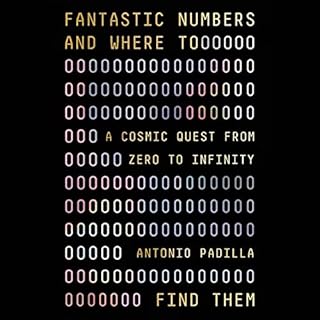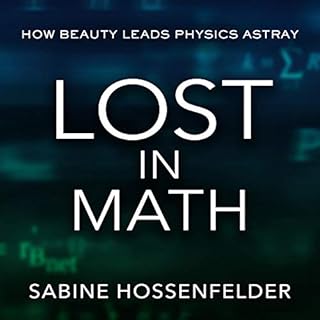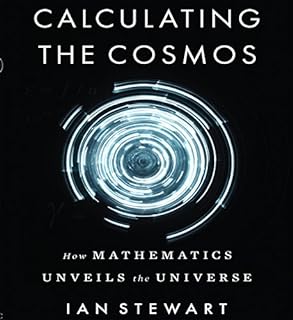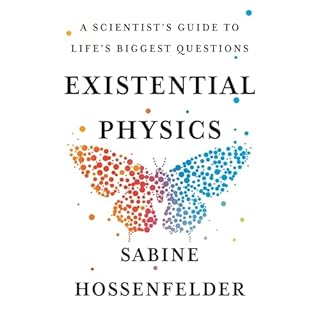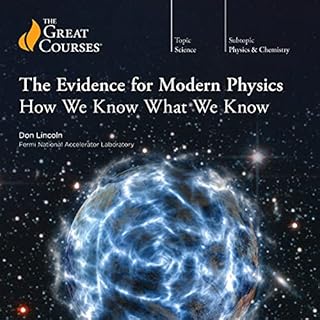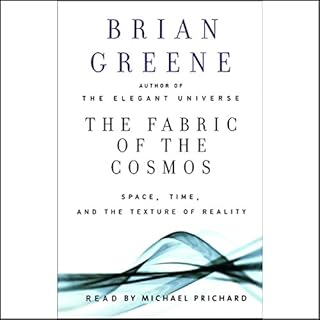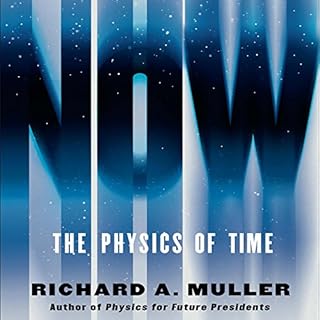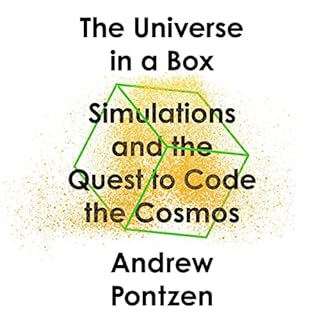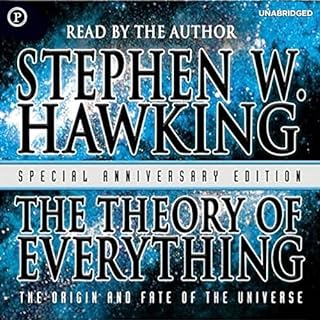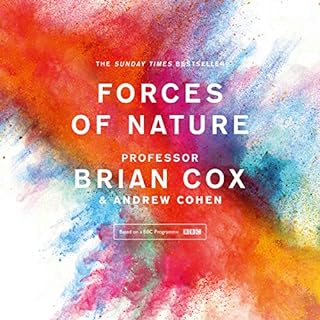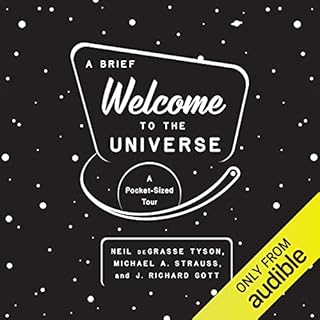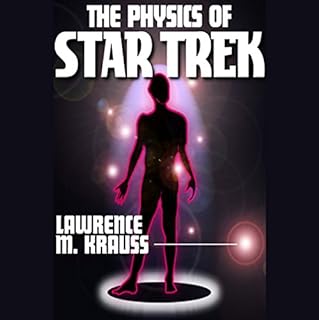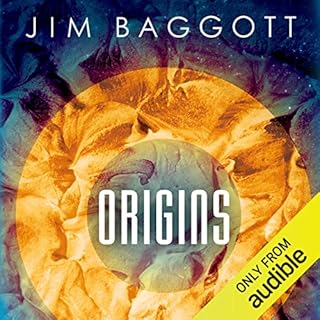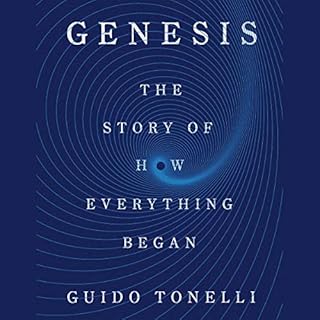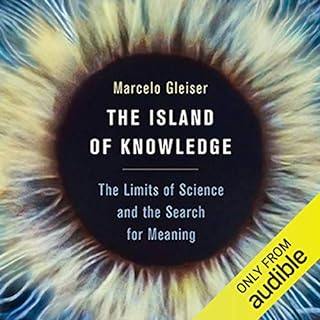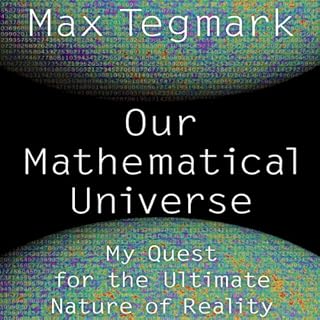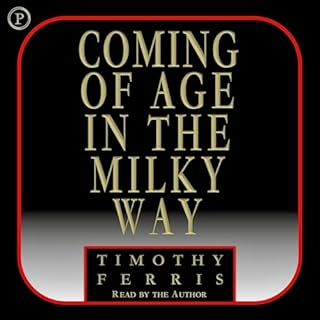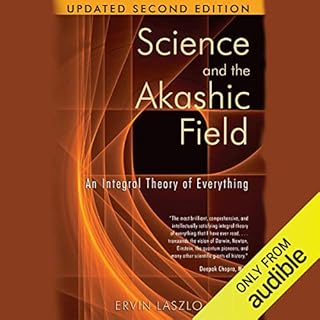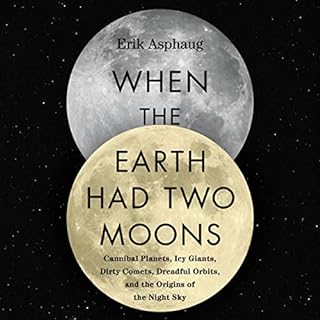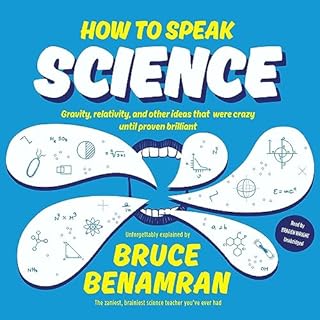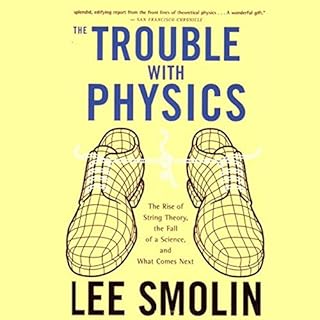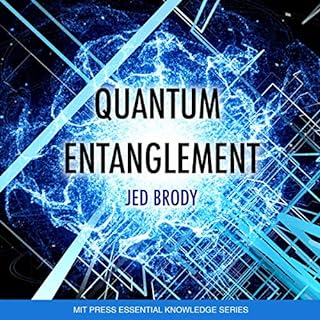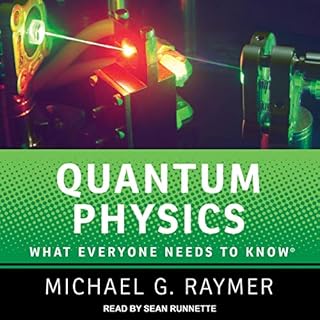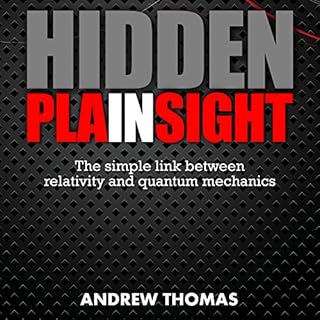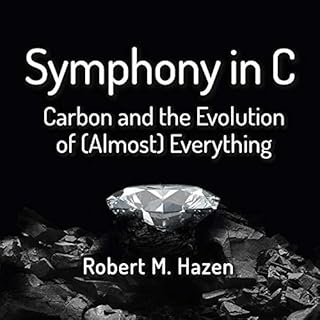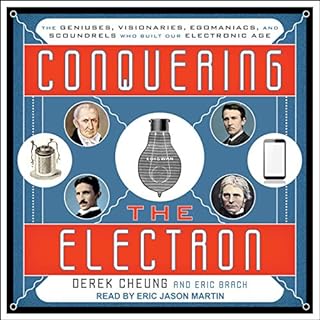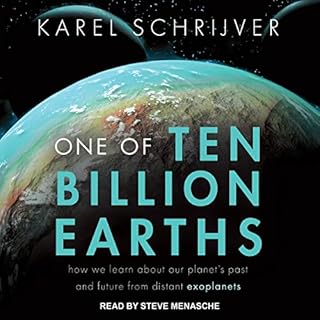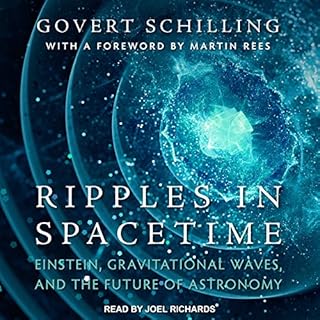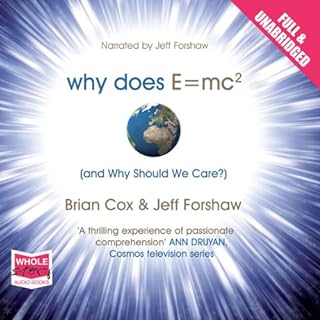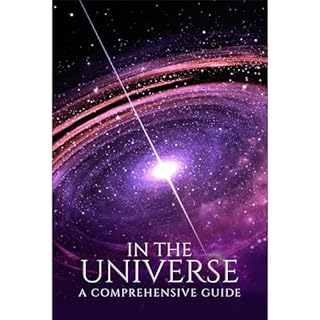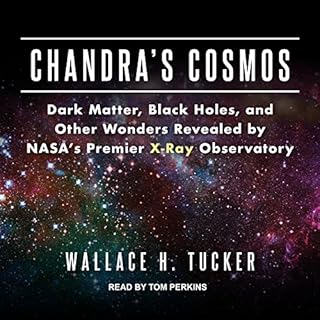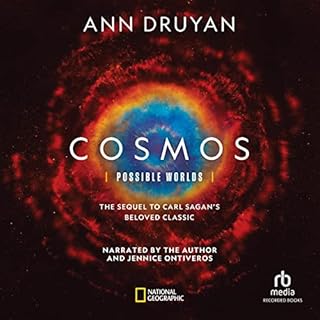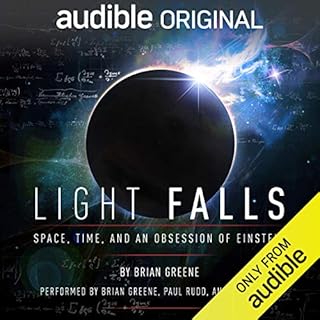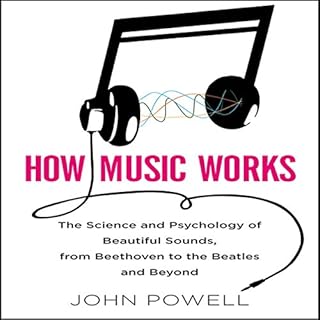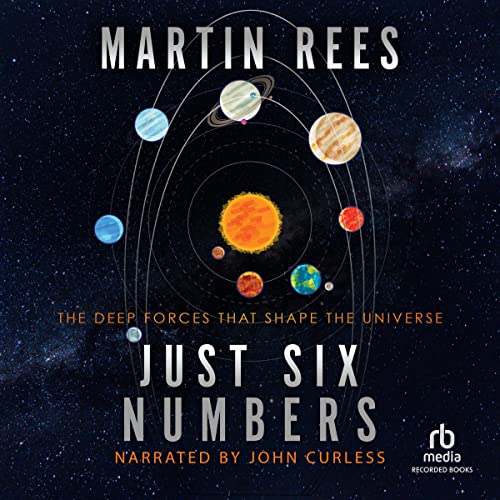
Just Six Numbers
The Deep Forces That Shape the Universe
Failed to add items
Add to Cart failed.
Add to Wish List failed.
Remove from wishlist failed.
Adding to library failed
Follow podcast failed
Unfollow podcast failed
Buy for $17.19
No default payment method selected.
We are sorry. We are not allowed to sell this product with the selected payment method
-
Narrated by:
-
John Curless
-
By:
-
Martin J. Rees
About this listen
How did a single "genesis event" create billions of galaxies, black holes, stars, and planets? How did atoms assemble - here on earth, and perhaps on other worlds - into living beings intricate enough to ponder their origins? What fundamental laws govern our universe?
This audiobook describes new discoveries and offers remarkable insights into these fundamental questions.
There are deep connections between stars and atoms, between the cosmos and the microworld. Just six numbers, imprinted in the "Big Bang", determine the essential features of our entire physical world. Moreover, cosmic evolution is astonishingly sensitive to the values of these numbers. If any one of them were "untuned", there could be no stars and no life. This realization offers a radically new perspective on our universe, our place in it, and the nature of physical laws.
©2000 Martin Rees (P)2018 Recorded BooksListeners also enjoyed...
-
Range
- Why Generalists Triumph in a Specialized World
- By: David Epstein
- Narrated by: Will Damron
- Length: 10 hrs and 46 mins
- Unabridged
-
Overall4.5 out of 5 stars 10,005
-
Performance4.5 out of 5 stars 8,417
-
Story4.5 out of 5 stars 8,375
Plenty of experts argue that anyone who wants to develop a skill, play an instrument, or lead their field should start early, focus intensely, and rack up as many hours of deliberate practice as possible. But a closer look at research on the world’s top performers shows that early specialization is the exception, not the rule. David Epstein examined the world’s most successful athletes, artists, musicians, inventors, forecasters and scientists. He discovered that in most fields—especially those that are complex and unpredictable—generalists, not specialists, are primed to excel.
-
5 out of 5 stars
-
If you're highly curious, read this
- By anon. on 06-07-19
By: David Epstein
-
Elon Musk
- By: Walter Isaacson
- Narrated by: Jeremy Bobb, Walter Isaacson
- Length: 20 hrs and 39 mins
- Unabridged
-
Overall5 out of 5 stars 7,955
-
Performance5 out of 5 stars 6,953
-
Story5 out of 5 stars 6,946
When Elon Musk was a kid in South Africa, he was regularly beaten by bullies. One day a group pushed him down some concrete steps and kicked him until his face was a swollen ball of flesh. He was in the hospital for a week. But the physical scars were minor compared to the emotional ones inflicted by his father, an engineer, rogue, and charismatic fantasist.
-
4 out of 5 stars
-
megalomania on display
- By JP on 09-12-23
By: Walter Isaacson
-
On the Future
- Prospects for Humanity
- By: Martin Rees
- Narrated by: Martin Rees, Samuel West
- Length: 5 hrs and 26 mins
- Unabridged
-
Overall4.5 out of 5 stars 155
-
Performance4.5 out of 5 stars 132
-
Story4.5 out of 5 stars 131
Humanity has reached a critical moment. Our world is unsettled and rapidly changing, and we face existential risks over the next century. Various outcomes - good and bad - are possible. Yet our approach to the future is characterized by short-term thinking, polarizing debates, alarmist rhetoric, and pessimism. In this short, exhilarating book, renowned scientist and best-selling author Martin Rees argues that humanity’s prospects depend on our taking a very different approach to planning for tomorrow.
-
5 out of 5 stars
-
Science, the future, and great wisdom
- By Philomath on 10-29-18
By: Martin Rees
-
White Holes
- By: Carlo Rovelli
- Narrated by: Harry Lloyd
- Length: 2 hrs and 48 mins
- Unabridged
-
Overall4.5 out of 5 stars 100
-
Performance5 out of 5 stars 95
-
Story4.5 out of 5 stars 95
Let us journey, with beloved physicist Carlo Rovelli, into the heart of a black hole. We slip beyond its horizon and tumble down this crack in the universe. As we plunge, we see geometry fold. Time and space pull and stretch. And finally, at the black hole’s core, space and time dissolve, and a white hole is born. Rovelli has dedicated his career to uniting the time-warping ideas of general relativity and the perplexing uncertainties of quantum mechanics. In White Holes, he reveals the mind of a scientist at work.
-
5 out of 5 stars
-
Absolutely Beyond Brilliant!
- By H. S. on 11-01-23
By: Carlo Rovelli
-
The Quantum Universe
- (And Why Anything That Can Happen, Does)
- By: Brian Cox, Jeff Forshaw
- Narrated by: Samuel West
- Length: 8 hrs and 28 mins
- Unabridged
-
Overall4.5 out of 5 stars 102
-
Performance4.5 out of 5 stars 91
-
Story4 out of 5 stars 90
In The Quantum Universe, Brian Cox and Jeff Forshaw approach the world of quantum mechanics in the same way they did in Why Does E=mc2? and make fundamental scientific principles accessible - and fascinating - to everyone.The subatomic realm has a reputation for weirdness, spawning any number of profound misunderstandings, journeys into Eastern mysticism, and woolly pronouncements on the interconnectedness of all things. Cox and Forshaw's contention? There is no need for quantum mechanics to be viewed this way.
-
1 out of 5 stars
-
Not suitable as an audio book
- By SPN on 03-29-22
By: Brian Cox, and others
-
The Universe
- The Book of the BBC TV Series Presented by Professor Brian Cox
- By: Andrew Cohen, Professor Brian Cox - foreword
- Narrated by: Brian Cox, Professor Jot Davies
- Length: 8 hrs and 32 mins
- Unabridged
-
Overall4.5 out of 5 stars 103
-
Performance4.5 out of 5 stars 90
-
Story4.5 out of 5 stars 90
With a foreword from Professor Brian Cox and access to all the latest NASA mission information, Andrew Cohen takes listeners on a voyage of discovery via the probes and telescopes exploring the outer reaches of our galaxy, revealing how it was formed and how it will inevitably be destroyed by the enigmatic black hole at its heart. And beyond our galaxy, the expanding universe, which holds clues to the biggest mystery of all - how did it all begin?
-
5 out of 5 stars
-
Listen to this alone and with your loved ones. You’ll be transported and inspired
- By MH on 02-26-22
By: Andrew Cohen, and others
-
Range
- Why Generalists Triumph in a Specialized World
- By: David Epstein
- Narrated by: Will Damron
- Length: 10 hrs and 46 mins
- Unabridged
-
Overall4.5 out of 5 stars 10,005
-
Performance4.5 out of 5 stars 8,417
-
Story4.5 out of 5 stars 8,375
Plenty of experts argue that anyone who wants to develop a skill, play an instrument, or lead their field should start early, focus intensely, and rack up as many hours of deliberate practice as possible. But a closer look at research on the world’s top performers shows that early specialization is the exception, not the rule. David Epstein examined the world’s most successful athletes, artists, musicians, inventors, forecasters and scientists. He discovered that in most fields—especially those that are complex and unpredictable—generalists, not specialists, are primed to excel.
-
5 out of 5 stars
-
If you're highly curious, read this
- By anon. on 06-07-19
By: David Epstein
-
Elon Musk
- By: Walter Isaacson
- Narrated by: Jeremy Bobb, Walter Isaacson
- Length: 20 hrs and 39 mins
- Unabridged
-
Overall5 out of 5 stars 7,955
-
Performance5 out of 5 stars 6,953
-
Story5 out of 5 stars 6,946
When Elon Musk was a kid in South Africa, he was regularly beaten by bullies. One day a group pushed him down some concrete steps and kicked him until his face was a swollen ball of flesh. He was in the hospital for a week. But the physical scars were minor compared to the emotional ones inflicted by his father, an engineer, rogue, and charismatic fantasist.
-
4 out of 5 stars
-
megalomania on display
- By JP on 09-12-23
By: Walter Isaacson
-
On the Future
- Prospects for Humanity
- By: Martin Rees
- Narrated by: Martin Rees, Samuel West
- Length: 5 hrs and 26 mins
- Unabridged
-
Overall4.5 out of 5 stars 155
-
Performance4.5 out of 5 stars 132
-
Story4.5 out of 5 stars 131
Humanity has reached a critical moment. Our world is unsettled and rapidly changing, and we face existential risks over the next century. Various outcomes - good and bad - are possible. Yet our approach to the future is characterized by short-term thinking, polarizing debates, alarmist rhetoric, and pessimism. In this short, exhilarating book, renowned scientist and best-selling author Martin Rees argues that humanity’s prospects depend on our taking a very different approach to planning for tomorrow.
-
5 out of 5 stars
-
Science, the future, and great wisdom
- By Philomath on 10-29-18
By: Martin Rees
-
White Holes
- By: Carlo Rovelli
- Narrated by: Harry Lloyd
- Length: 2 hrs and 48 mins
- Unabridged
-
Overall4.5 out of 5 stars 100
-
Performance5 out of 5 stars 95
-
Story4.5 out of 5 stars 95
Let us journey, with beloved physicist Carlo Rovelli, into the heart of a black hole. We slip beyond its horizon and tumble down this crack in the universe. As we plunge, we see geometry fold. Time and space pull and stretch. And finally, at the black hole’s core, space and time dissolve, and a white hole is born. Rovelli has dedicated his career to uniting the time-warping ideas of general relativity and the perplexing uncertainties of quantum mechanics. In White Holes, he reveals the mind of a scientist at work.
-
5 out of 5 stars
-
Absolutely Beyond Brilliant!
- By H. S. on 11-01-23
By: Carlo Rovelli
-
The Quantum Universe
- (And Why Anything That Can Happen, Does)
- By: Brian Cox, Jeff Forshaw
- Narrated by: Samuel West
- Length: 8 hrs and 28 mins
- Unabridged
-
Overall4.5 out of 5 stars 102
-
Performance4.5 out of 5 stars 91
-
Story4 out of 5 stars 90
In The Quantum Universe, Brian Cox and Jeff Forshaw approach the world of quantum mechanics in the same way they did in Why Does E=mc2? and make fundamental scientific principles accessible - and fascinating - to everyone.The subatomic realm has a reputation for weirdness, spawning any number of profound misunderstandings, journeys into Eastern mysticism, and woolly pronouncements on the interconnectedness of all things. Cox and Forshaw's contention? There is no need for quantum mechanics to be viewed this way.
-
1 out of 5 stars
-
Not suitable as an audio book
- By SPN on 03-29-22
By: Brian Cox, and others
-
The Universe
- The Book of the BBC TV Series Presented by Professor Brian Cox
- By: Andrew Cohen, Professor Brian Cox - foreword
- Narrated by: Brian Cox, Professor Jot Davies
- Length: 8 hrs and 32 mins
- Unabridged
-
Overall4.5 out of 5 stars 103
-
Performance4.5 out of 5 stars 90
-
Story4.5 out of 5 stars 90
With a foreword from Professor Brian Cox and access to all the latest NASA mission information, Andrew Cohen takes listeners on a voyage of discovery via the probes and telescopes exploring the outer reaches of our galaxy, revealing how it was formed and how it will inevitably be destroyed by the enigmatic black hole at its heart. And beyond our galaxy, the expanding universe, which holds clues to the biggest mystery of all - how did it all begin?
-
5 out of 5 stars
-
Listen to this alone and with your loved ones. You’ll be transported and inspired
- By MH on 02-26-22
By: Andrew Cohen, and others
-
Fantastic Numbers and Where to Find Them
- A Cosmic Quest from Zero to Infinity
- By: Antonio Padilla
- Narrated by: Antonio Padilla
- Length: 13 hrs and 53 mins
- Unabridged
-
Overall4.5 out of 5 stars 56
-
Performance4.5 out of 5 stars 49
-
Story4 out of 5 stars 49
For particularly brilliant theoretical physicists like James Clerk Maxwell, Paul Dirac, or Albert Einstein, the search for mathematical truths led to strange new understandings of the ultimate nature of reality. But what are these truths? What are the mysterious numbers that explain the universe? In Fantastic Numbers and Where to Find Them, the leading theoretical physicist and YouTube star Antonio Padilla takes us on an irreverent cosmic tour of nine of the most extraordinary numbers in physics, offering a startling picture of how the universe works.
-
3 out of 5 stars
-
Exciting, Strange, Difficult = Meh
- By Michael on 05-23-23
By: Antonio Padilla
-
Anaximander
- And the Birth of Science
- By: Carlo Rovelli
- Narrated by: Roy McMillan
- Length: 5 hrs and 42 mins
- Unabridged
-
Overall4.5 out of 5 stars 77
-
Performance4.5 out of 5 stars 63
-
Story4.5 out of 5 stars 63
Over two millennia ago, the prescient insights of Anaximander paved the way for cosmology, physics, geography, meteorology, and biology, setting in motion a new way of seeing the world. His legacy includes the revolutionary ideas that the Earth floats in a void, that animals evolved, that the world can be understood in natural rather than supernatural terms, and that universal laws govern all phenomena. In this elegant work, the renowned theoretical physicist Carlo Rovelli brings to light the importance of Anaximander’s overlooked influence on modern science
-
4 out of 5 stars
-
Father of Science
- By Darwin8u on 10-31-24
By: Carlo Rovelli
-
Lost in Math
- How Beauty Leads Physics Astray
- By: Sabine Hossenfelder
- Narrated by: Laura Jennings
- Length: 8 hrs and 40 mins
- Unabridged
-
Overall4.5 out of 5 stars 1,002
-
Performance4.5 out of 5 stars 860
-
Story4.5 out of 5 stars 851
Whether pondering black holes or predicting discoveries at CERN, physicists believe the best theories are beautiful, natural, and elegant, and this standard separates popular theories from disposable ones. This is why, Sabine Hossenfelder argues, we have not seen a major breakthrough in the foundations of physics for more than four decades. The belief in beauty has become so dogmatic that it now conflicts with scientific objectivity: Observation has been unable to confirm mindboggling theories, like supersymmetry or grand unification, invented by physicists based on aesthetic criteria.
-
5 out of 5 stars
-
A rare glimpse into the inner world of physics
- By Joe on 12-08-18
-
Calculating the Cosmos
- How Mathematics Unveils the Universe
- By: Ian Stewart
- Narrated by: Dana Hickox
- Length: 12 hrs and 39 mins
- Unabridged
-
Overall4.5 out of 5 stars 116
-
Performance3.5 out of 5 stars 109
-
Story4.5 out of 5 stars 105
In Calculating the Cosmos, Ian Stewart presents an exhilarating guide to the cosmos, from our solar system to the entire universe. He describes the architecture of space and time, dark matter and dark energy, how galaxies form, why stars implode, how everything began, and how it's all going to end. He considers parallel universes, the fine-tuning of the cosmos for life, what forms extraterrestrial life might take, and the likelihood of life on Earth being snuffed out by an asteroid.
-
2 out of 5 stars
-
Crank alert: rejects modern cosmology
- By James Weisner on 03-20-17
By: Ian Stewart
-
Existential Physics
- A Scientist's Guide to Life's Biggest Questions
- By: Sabine Hossenfelder
- Narrated by: Gina Daniels
- Length: 8 hrs and 7 mins
- Unabridged
-
Overall4.5 out of 5 stars 408
-
Performance4.5 out of 5 stars 361
-
Story4.5 out of 5 stars 355
Not only can we not currently explain the origin of the universe, it is questionable we will ever be able to explain it. The notion that there are universes within particles, or that particles are conscious, is ascientific, as is the hypothesis that our universe is a computer simulation. On the other hand, the idea that the universe itself is conscious is difficult to rule out entirely.
-
2 out of 5 stars
-
Unscientific and unengaging
- By Jase G on 03-29-23
-
The Evidence for Modern Physics
- How We Know What We Know
- By: Professor Don Lincoln, The Great Courses
- Narrated by: Professor Don Lincoln
- Length: 11 hrs and 54 mins
- Original Recording
-
Overall5 out of 5 stars 447
-
Performance5 out of 5 stars 379
-
Story5 out of 5 stars 375
In this 24-lesson course aimed at non-scientists, noted particle physicist Dr. Don Lincoln of Fermi National Accelerator Laboratory covers more than a century of progress in physics, describing exactly how scientists reach the conclusions they do. He starts with the atom, which was long hypothesized but wasn’t definitively proven until a paper by Albert Einstein in 1905. That was just the beginning, as researchers probed ever deeper into the atom’s complex structure, leading to the weird findings of quantum mechanics.
-
5 out of 5 stars
-
Strongly Recommend for Everyone
- By Liam A on 05-23-21
By: Professor Don Lincoln, and others
-
The Fabric of the Cosmos
- Space, Time, and the Texture of Reality
- By: Brian Greene
- Narrated by: Michael Prichard
- Length: 22 hrs and 36 mins
- Unabridged
-
Overall4.5 out of 5 stars 2,056
-
Performance4.5 out of 5 stars 1,112
-
Story4.5 out of 5 stars 1,104
Space and time form the very fabric of the cosmos. Yet they remain among the most mysterious of concepts. Is space an entity? Why does time have a direction? Could the universe exist without space and time? Can we travel to the past?
-
4 out of 5 stars
-
Lucid, Revealing, Thorough
- By Matthew on 02-23-04
By: Brian Greene
-
Now
- The Physics of Time - and the Ephemeral Moment That Einstein Could Not Explain
- By: Richard A. Muller
- Narrated by: Christopher Grove
- Length: 10 hrs and 3 mins
- Unabridged
-
Overall4.5 out of 5 stars 603
-
Performance4.5 out of 5 stars 522
-
Story4.5 out of 5 stars 517
You are reading the word now right now. But what does that mean? What makes the ephemeral moment "now" so special? Its enigmatic character has bedeviled philosophers, priests, and modern-day physicists from Augustine to Einstein and beyond. Einstein showed that the flow of time is affected by both velocity and gravity, yet he despaired at his failure to explain the meaning of now. Equally puzzling: Why does time flow? Some physicists have given up trying to understand and call the flow of time an illusion.
-
2 out of 5 stars
-
Physics mixed with spiritual claptrap!
- By Effe Oake on 04-03-17
-
Welcome to the Universe
- An Astrophysical Tour
- By: Michael A. Strauss, J. Richard Gott, Neil deGrasse Tyson
- Narrated by: Michael Butler Murray
- Length: 17 hrs and 53 mins
- Unabridged
-
Overall4.5 out of 5 stars 1,373
-
Performance4.5 out of 5 stars 1,211
-
Story4.5 out of 5 stars 1,206
Welcome to the Universe is a personal guided tour of the cosmos by three of today's leading astrophysicists. Inspired by the enormously popular introductory astronomy course that Neil deGrasse Tyson, Michael A. Strauss, and J. Richard Gott taught together at Princeton, this book covers it all - from planets, stars, and galaxies to black holes, wormholes, and time travel.
-
3 out of 5 stars
-
All About What We Know About the Universe - ALL
- By J.B. on 02-17-17
By: Michael A. Strauss, and others
-
Block by Block
- The Historical and Theoretical Foundations of Thermodynamics
- By: Robert T. Hanlon
- Narrated by: Paul Heitsch
- Length: 33 hrs and 47 mins
- Unabridged
-
Overall4.5 out of 5 stars 28
-
Performance5 out of 5 stars 23
-
Story4.5 out of 5 stars 23
Block by Block offers an original perspective on thermodynamic science and history based on the three approaches of a practicing engineer, academician, and historian. The book synthesizes and gathers into one accessible volume a strategic range of foundational topics involving the atomic theory, energy, entropy, and the laws of thermodynamics.
-
3 out of 5 stars
-
Incomplete
- By William G Carrig on 11-27-20
By: Robert T. Hanlon
-
The Universe in a Box
- Simulations and the Quest to Code the Cosmos
- By: Andrew Pontzen
- Narrated by: Andrew Pontzen
- Length: 8 hrs and 23 mins
- Unabridged
-
Overall4.5 out of 5 stars 21
-
Performance5 out of 5 stars 17
-
Story4.5 out of 5 stars 17
In The Universe in a Box, cosmologist Andrew Pontzen explains how physicists model the universe’s most exotic phenomena, from black holes and colliding galaxies to dark matter and quantum entanglement, enabling them to study the evolution of virtual worlds and to shed new light on our reality.
-
5 out of 5 stars
-
makes me wanna specialize in weak emergence and simulations
- By Logan Jones on 06-17-24
By: Andrew Pontzen
-
The Edge of Knowledge
- Unsolved Mysteries of the Cosmos
- By: Lawrence M. Krauss
- Narrated by: Lawrence M. Krauss
- Length: 7 hrs and 39 mins
- Unabridged
-
Overall4.5 out of 5 stars 42
-
Performance4.5 out of 5 stars 36
-
Story5 out of 5 stars 36
Three of the most important words in science are I don't know. Not knowing implies a universe of opportunities—the possibility of discovery and surprise. Our understanding of science has advanced immeasurably over the last 500 years, yet many fundamental mysteries of existence persist: How did our universe begin? How big is the universe? Is time travel possible? What’s at the center of a black hole? How did life on Earth arise? Are we alone? What is consciousness, and can we create it?
-
1 out of 5 stars
-
he lacks knowledge about his topics
- By Anonymous User on 05-28-23
Related to this topic
-
Calculating the Cosmos
- How Mathematics Unveils the Universe
- By: Ian Stewart
- Narrated by: Dana Hickox
- Length: 12 hrs and 39 mins
- Unabridged
-
Overall4.5 out of 5 stars 116
-
Performance3.5 out of 5 stars 109
-
Story4.5 out of 5 stars 105
In Calculating the Cosmos, Ian Stewart presents an exhilarating guide to the cosmos, from our solar system to the entire universe. He describes the architecture of space and time, dark matter and dark energy, how galaxies form, why stars implode, how everything began, and how it's all going to end. He considers parallel universes, the fine-tuning of the cosmos for life, what forms extraterrestrial life might take, and the likelihood of life on Earth being snuffed out by an asteroid.
-
2 out of 5 stars
-
Crank alert: rejects modern cosmology
- By James Weisner on 03-20-17
By: Ian Stewart
-
The Cosmic Cocktail
- Three Parts Dark Matter
- By: Katherine Freese
- Narrated by: Tamara Marston
- Length: 9 hrs and 29 mins
- Unabridged
-
Overall4 out of 5 stars 103
-
Performance4 out of 5 stars 87
-
Story4 out of 5 stars 87
The ordinary atoms that make up the known universe - from our bodies and the air we breathe to the planets and stars - constitute only 5 percent of all matter and energy in the cosmos. The rest is known as dark matter and dark energy, because their precise identities are unknown. The Cosmic Cocktail is the inside story of the epic quest to solve one of the most compelling enigmas of modern science - what is the universe made of? - told by one of today’s foremost pioneers in the study of dark matter.
-
2 out of 5 stars
-
I was looking for a book about science....
- By Jeff on 03-27-15
By: Katherine Freese
-
The Theory of Everything
- The Origin and Fate of the Universe
- By: Stephen Hawking
- Narrated by: Michael York
- Length: 3 hrs and 30 mins
- Unabridged
-
Overall4.5 out of 5 stars 1,124
-
Performance4.5 out of 5 stars 924
-
Story4.5 out of 5 stars 916
In physicist Stephen Hawking's brilliant opus, A Brief History of Time, he presented us with a bold new look at our universe, how it began, and how our old views of physics and tired theories about the creation of the universe were no longer relevant. In other words, Hawking gave us a new look at our world, our universe, and ourselves. Now, Hawking presents an even more comprehensive look at our universe, its creation, and how we see ourselves within it.
-
5 out of 5 stars
-
Shares a lot of text with a Brief History of Time.
- By Roc Myers on 01-07-15
By: Stephen Hawking
-
Forces of Nature
- By: Professor Brian Cox, Andrew Cohen
- Narrated by: Samuel West
- Length: 7 hrs and 15 mins
- Unabridged
-
Overall4.5 out of 5 stars 490
-
Performance5 out of 5 stars 438
-
Story4.5 out of 5 stars 432
Professor Brian Cox uncovers some of the most extraordinary natural events on Earth and in the universe and beyond. From the immensity of the universe and the roundness of Earth to the form of every single snowflake, the forces of nature shape everything we see. Pushed to extremes, the results are astonishing. In seeking to understand the everyday world, the colours, structure, behaviour and history of our home, we develop the knowledge and techniques necessary to step beyond the everyday.
-
4 out of 5 stars
-
Complicated in its simplicity
- By Philomath on 06-13-17
By: Professor Brian Cox, and others
-
A Brief Welcome to the Universe
- A Pocket-Sized Tour
- By: Neil deGrasse Tyson, Michael A. Strauss, J. Richard Gott
- Narrated by: Neil Hellegers
- Length: 4 hrs and 7 mins
- Unabridged
-
Overall4.5 out of 5 stars 68
-
Performance4.5 out of 5 stars 53
-
Story4.5 out of 5 stars 53
A Brief Welcome to the Universe offers a breathtaking tour of the cosmos, from planets, stars, and galaxies to black holes and time loops. Best-selling authors and acclaimed astrophysicists Neil deGrasse Tyson, Michael A. Strauss, and J. Richard Gott take listeners on an unforgettable journey of exploration to reveal how our universe actually works. Propelling you from our home solar system to the outermost frontiers of space, this book builds your cosmic insight and perspective through a marvelously entertaining narrative.
-
5 out of 5 stars
-
A brief welcome for everyone
- By Ashley F on 08-24-24
By: Neil deGrasse Tyson, and others
-
The Physics of Star Trek
- By: Lawrence M. Krauss
- Narrated by: Larry McKeever
- Length: 6 hrs and 40 mins
- Unabridged
-
Overall4 out of 5 stars 407
-
Performance4 out of 5 stars 264
-
Story4.5 out of 5 stars 262
What actually happens when the words, "beam me up, Scottie" are uttered? What "warps" when something travels at warp speed? Internationally renowned theoretical physicist and educator Lawrence M. Krauss provides matter-of-fact scientific explanations of the physics of Star Trek in this highly creative and informative guide for both the devoted Trekkie and the physics novice.
-
3 out of 5 stars
-
Interesting Book. Quite Technical
- By Christopher B. on 12-07-04
-
Calculating the Cosmos
- How Mathematics Unveils the Universe
- By: Ian Stewart
- Narrated by: Dana Hickox
- Length: 12 hrs and 39 mins
- Unabridged
-
Overall4.5 out of 5 stars 116
-
Performance3.5 out of 5 stars 109
-
Story4.5 out of 5 stars 105
In Calculating the Cosmos, Ian Stewart presents an exhilarating guide to the cosmos, from our solar system to the entire universe. He describes the architecture of space and time, dark matter and dark energy, how galaxies form, why stars implode, how everything began, and how it's all going to end. He considers parallel universes, the fine-tuning of the cosmos for life, what forms extraterrestrial life might take, and the likelihood of life on Earth being snuffed out by an asteroid.
-
2 out of 5 stars
-
Crank alert: rejects modern cosmology
- By James Weisner on 03-20-17
By: Ian Stewart
-
The Cosmic Cocktail
- Three Parts Dark Matter
- By: Katherine Freese
- Narrated by: Tamara Marston
- Length: 9 hrs and 29 mins
- Unabridged
-
Overall4 out of 5 stars 103
-
Performance4 out of 5 stars 87
-
Story4 out of 5 stars 87
The ordinary atoms that make up the known universe - from our bodies and the air we breathe to the planets and stars - constitute only 5 percent of all matter and energy in the cosmos. The rest is known as dark matter and dark energy, because their precise identities are unknown. The Cosmic Cocktail is the inside story of the epic quest to solve one of the most compelling enigmas of modern science - what is the universe made of? - told by one of today’s foremost pioneers in the study of dark matter.
-
2 out of 5 stars
-
I was looking for a book about science....
- By Jeff on 03-27-15
By: Katherine Freese
-
The Theory of Everything
- The Origin and Fate of the Universe
- By: Stephen Hawking
- Narrated by: Michael York
- Length: 3 hrs and 30 mins
- Unabridged
-
Overall4.5 out of 5 stars 1,124
-
Performance4.5 out of 5 stars 924
-
Story4.5 out of 5 stars 916
In physicist Stephen Hawking's brilliant opus, A Brief History of Time, he presented us with a bold new look at our universe, how it began, and how our old views of physics and tired theories about the creation of the universe were no longer relevant. In other words, Hawking gave us a new look at our world, our universe, and ourselves. Now, Hawking presents an even more comprehensive look at our universe, its creation, and how we see ourselves within it.
-
5 out of 5 stars
-
Shares a lot of text with a Brief History of Time.
- By Roc Myers on 01-07-15
By: Stephen Hawking
-
Forces of Nature
- By: Professor Brian Cox, Andrew Cohen
- Narrated by: Samuel West
- Length: 7 hrs and 15 mins
- Unabridged
-
Overall4.5 out of 5 stars 490
-
Performance5 out of 5 stars 438
-
Story4.5 out of 5 stars 432
Professor Brian Cox uncovers some of the most extraordinary natural events on Earth and in the universe and beyond. From the immensity of the universe and the roundness of Earth to the form of every single snowflake, the forces of nature shape everything we see. Pushed to extremes, the results are astonishing. In seeking to understand the everyday world, the colours, structure, behaviour and history of our home, we develop the knowledge and techniques necessary to step beyond the everyday.
-
4 out of 5 stars
-
Complicated in its simplicity
- By Philomath on 06-13-17
By: Professor Brian Cox, and others
-
A Brief Welcome to the Universe
- A Pocket-Sized Tour
- By: Neil deGrasse Tyson, Michael A. Strauss, J. Richard Gott
- Narrated by: Neil Hellegers
- Length: 4 hrs and 7 mins
- Unabridged
-
Overall4.5 out of 5 stars 68
-
Performance4.5 out of 5 stars 53
-
Story4.5 out of 5 stars 53
A Brief Welcome to the Universe offers a breathtaking tour of the cosmos, from planets, stars, and galaxies to black holes and time loops. Best-selling authors and acclaimed astrophysicists Neil deGrasse Tyson, Michael A. Strauss, and J. Richard Gott take listeners on an unforgettable journey of exploration to reveal how our universe actually works. Propelling you from our home solar system to the outermost frontiers of space, this book builds your cosmic insight and perspective through a marvelously entertaining narrative.
-
5 out of 5 stars
-
A brief welcome for everyone
- By Ashley F on 08-24-24
By: Neil deGrasse Tyson, and others
-
The Physics of Star Trek
- By: Lawrence M. Krauss
- Narrated by: Larry McKeever
- Length: 6 hrs and 40 mins
- Unabridged
-
Overall4 out of 5 stars 407
-
Performance4 out of 5 stars 264
-
Story4.5 out of 5 stars 262
What actually happens when the words, "beam me up, Scottie" are uttered? What "warps" when something travels at warp speed? Internationally renowned theoretical physicist and educator Lawrence M. Krauss provides matter-of-fact scientific explanations of the physics of Star Trek in this highly creative and informative guide for both the devoted Trekkie and the physics novice.
-
3 out of 5 stars
-
Interesting Book. Quite Technical
- By Christopher B. on 12-07-04
-
Origins
- The Scientific Story of Creation
- By: Jim Baggott
- Narrated by: Neil Scott-Barbour
- Length: 16 hrs and 47 mins
- Unabridged
-
Overall4.5 out of 5 stars 71
-
Performance4 out of 5 stars 60
-
Story4.5 out of 5 stars 57
What is the nature of the material world? How does it work? What is the universe and how was it formed? What is life? Where do we come from and how did we evolve? How and why do we think? What does it mean to be human? How do we know? There are many different versions of our creation story. This book tells the version according to modern science. It is a unique account, starting at the Big Bang and travelling right up to the emergence of humans as conscious intelligent beings, 13.8 billion years later.
-
4 out of 5 stars
-
Interesting book, but WOW, the narrator ...
- By UH on 01-10-17
By: Jim Baggott
-
Genesis
- The Story of How Everything Began
- By: Guido Tonelli, Erica Segre - translator, Simon Carnell - translator
- Narrated by: Damian Lynch
- Length: 6 hrs and 49 mins
- Unabridged
-
Overall4.5 out of 5 stars 42
-
Performance4.5 out of 5 stars 35
-
Story4.5 out of 5 stars 35
A breakout best seller in Italy, now available for American listeners for the first time, Genesis: The Story of How Everything Began is a short, humanistic tour of the origins of the universe, earth, and life - drawing on the latest discoveries in physics to explain the seven most significant moments in the creation of the cosmos.
-
2 out of 5 stars
-
This is soooo boring to listen to
- By A. Galer on 02-27-23
By: Guido Tonelli, and others
-
The World According to Physics
- By: Jim Al-Khalili
- Narrated by: Jim Al-Khalili
- Length: 6 hrs and 35 mins
- Unabridged
-
Overall4.5 out of 5 stars 105
-
Performance5 out of 5 stars 94
-
Story4.5 out of 5 stars 94
Shining a light on the most profound insights revealed by modern physics, Jim Al-Khalili invites us all to understand what this crucially important science tells us about the universe and the nature of reality itself. Al-Khalili begins by introducing the fundamental concepts of space, time, energy, and matter, and then describes the three pillars of modern physics - quantum theory, relativity, and thermodynamics - showing how all three must come together if we are ever to have a full understanding of reality.
-
5 out of 5 stars
-
excellent book
- By Anonymous User on 05-10-21
By: Jim Al-Khalili
-
The Island of Knowledge
- The Limits of Science and the Search for Meaning
- By: Marcelo Gleiser
- Narrated by: William Neenan
- Length: 10 hrs and 33 mins
- Unabridged
-
Overall4 out of 5 stars 552
-
Performance4.5 out of 5 stars 488
-
Story4 out of 5 stars 486
How much can we know about the world? In this audiobook physicist Marcelo Gleiser traces our search for answers to the most fundamental questions of existence, the origin of the universe, the nature of reality, and the limits of knowledge. In so doing he reaches a provocative conclusion: Science, like religion, is fundamentally limited as a tool for understanding the world. As science and its philosophical interpretations advance, we face the unsettling recognition of how much we don't know.
-
4 out of 5 stars
-
Island of knowledge
- By Joshua Kring on 07-26-15
By: Marcelo Gleiser
-
Our Mathematical Universe
- My Quest for the Ultimate Nature of Reality
- By: Max Tegmark
- Narrated by: Rob Shapiro
- Length: 15 hrs and 22 mins
- Unabridged
-
Overall4.5 out of 5 stars 2,511
-
Performance4.5 out of 5 stars 2,195
-
Story4.5 out of 5 stars 2,186
Max Tegmark leads us on an astonishing journey through past, present and future, and through the physics, astronomy, and mathematics that are the foundation of his work, most particularly his hypothesis that our physical reality is a mathematical structure and his theory of the ultimate multiverse. In a dazzling combination of both popular and groundbreaking science, he not only helps us grasp his often mind-boggling theories, but he also shares with us some of the often surprising triumphs and disappointments that have shaped his life as a scientist.
-
5 out of 5 stars
-
Wow!
- By Michael on 02-02-14
By: Max Tegmark
-
Exoplanets
- Diamond Worlds, Super Earths, Pulsar Planets, and the New Search for Life Beyond Our Solar System
- By: Michael Summers
- Narrated by: Jon Bennett
- Length: 5 hrs and 39 mins
- Unabridged
-
Overall4.5 out of 5 stars 179
-
Performance4.5 out of 5 stars 148
-
Story4.5 out of 5 stars 146
Since its 2009 launch, the Kepler satellite has discovered more than 2,000 exoplanets, or planets outside our solar system. More exoplanets are being discovered all the time, remarkable in their variety. Astronomer Michael Summers and physicist James Trefil explore these remarkable recent discoveries: planets revolving around pulsars, planets made of diamond, planets that are mostly water, and numerous rogue planets wandering through the emptiness of space.
-
5 out of 5 stars
-
FINALLY, an Attention-Grabbing Planet Book!
- By aaron on 05-11-17
By: Michael Summers
-
Coming of Age in the Milky Way
- By: Timothy Ferris
- Narrated by: Timothy Ferris
- Length: 2 hrs and 44 mins
- Abridged
-
Overall4 out of 5 stars 113
-
Performance4 out of 5 stars 61
-
Story4 out of 5 stars 63
Humans have long sought to comprehend the enormities of cosmic space and time. Here, best selling science writer Timothy Ferris tells the story of that quest. He interweaves the majestic themes of astronomy, physics, religion, and philosophy with fresh and lasting portraits of the men and women who created what has been called our society's most precious treasure - its conception of the universe at large.
-
2 out of 5 stars
-
Brief survey of discovery from Columbus to now
- By serine on 01-23-16
By: Timothy Ferris
-
The Quantum Story
- A History in 40 Moments
- By: Jim Baggott
- Narrated by: Mike Pollock
- Length: 15 hrs and 27 mins
- Unabridged
-
Overall4 out of 5 stars 235
-
Performance4 out of 5 stars 174
-
Story4 out of 5 stars 174
Utterly beautiful. Profoundly disconcerting. Quantum theory is quite simply the most successful account of the physical universe ever devised. Its concepts underpin much of the 21st-century technology that we now take for granted. But at the same time it has completely undermined our ability to make sense of the world at its most fundamental level.
-
1 out of 5 stars
-
who's the target reader?
- By Hannah on 09-17-11
By: Jim Baggott
-
Science and the Akashic Field
- An Integral Theory of Everything
- By: Ervin Laszlo
- Narrated by: Tom Pile
- Length: 6 hrs and 52 mins
- Unabridged
-
Overall4.5 out of 5 stars 314
-
Performance4.5 out of 5 stars 264
-
Story4.5 out of 5 stars 262
Mystics and sages have long maintained that there exists an interconnecting cosmic field at the roots of reality that conserves and conveys information, a field known as the Akashic record. Recent discoveries in vacuum physics show that this Akashic field is real and has its equivalent in science's zero-point field that underlies space itself. This field consists of a subtle sea of fluctuating energies from which all things arise: atoms and galaxies, stars and planets, living beings, and even consciousness.
-
4 out of 5 stars
-
A must-read about ultimate nature of reality
- By Alexandra Hopkins on 04-15-18
By: Ervin Laszlo
-
When the Earth Had Two Moons
- Cannibal Planets, Icy Giants, Dirty Comets, Dreadful Orbits, and the Origins of the Night Sky
- By: Erik Asphaug
- Narrated by: Adam Verner
- Length: 9 hrs and 9 mins
- Unabridged
-
Overall4 out of 5 stars 67
-
Performance4.5 out of 5 stars 53
-
Story4 out of 5 stars 53
In 1959, the Soviet probe Luna 3 took the first photos of the far side of the Moon. Even in their poor resolution, the images stunned scientists: The far side is an enormous mountainous expanse, not the vast lava plains seen from Earth. Subsequent missions have confirmed this in much greater detail. How could this be, and what might it tell us about our own place in the universe? As it turns out, quite a lot. When the Earth Had Two Moons is an astonishing exploration of planet formation and the origins of life by one of the world’s most innovative planetary geologists.
-
1 out of 5 stars
-
Poorly written, poorly narrated
- By RickyF on 05-11-23
By: Erik Asphaug
-
How to Speak Science
- Gravity, Relativity, and Other Ideas That Were Crazy Until Proven Brilliant
- By: Bruce Benamran, Stephanie Delozier Strobel
- Narrated by: Braden Wright
- Length: 13 hrs and 11 mins
- Unabridged
-
Overall4.5 out of 5 stars 219
-
Performance4.5 out of 5 stars 196
-
Story4.5 out of 5 stars 192
As smartphones, supercomputers, supercolliders, and AI propel us into an ever more unfamiliar future, How to Speak Science takes us on a rollicking historical tour of the greatest discoveries and ideas that make today's cutting-edge technologies possible. Wanting everyone to be able to "speak" science, YouTube science guru Bruce Benamran explains - as accessibly and wittily as in his acclaimed videos - the fundamental ideas of the physical world: matter, life, the solar system, light, electromagnetism, thermodynamics, special and general relativity, and much more.
-
5 out of 5 stars
-
Wowzers!
- By Ralph Temblador on 02-15-21
By: Bruce Benamran, and others
-
The Trouble with Physics
- The Rise of String Theory, The Fall of a Science, and What Comes Next
- By: Lee Smolin
- Narrated by: Walter Dixon
- Length: 14 hrs and 49 mins
- Unabridged
-
Overall4 out of 5 stars 534
-
Performance4.5 out of 5 stars 358
-
Story4 out of 5 stars 361
In this illuminating book, the renowned theoretical physicist Lee Smolin argues that fundamental physics - the search for the laws of nature - is losing its way. Ambitious ideas about extra dimensions, exotic particles, multiple universes, and strings have captured the publics imagination -- and the imagination of experts.
-
4 out of 5 stars
-
Strings snipped
- By J B Tipton on 06-06-10
By: Lee Smolin
People who viewed this also viewed...
-
Quantum Entanglement
- MIT Press Essential Knowledge Series
- By: Jed Brody
- Narrated by: Jonathan Todd Ross
- Length: 3 hrs and 34 mins
- Unabridged
-
Overall4 out of 5 stars 52
-
Performance4 out of 5 stars 48
-
Story3.5 out of 5 stars 48
Quantum physics is notable for its brazen defiance of common sense. (Think of Schrödinger's Cat, famously both dead and alive.) An especially rigorous form of quantum contradiction occurs in experiments with entangled particles. Our common assumption is that objects have properties whether or not anyone is observing them, and the measurement of one can't affect the other. Quantum entanglement rejects this assumption, offering impeccable reasoning and irrefutable evidence of the opposite. Is quantum entanglement mystical, or just mystifying?
-
2 out of 5 stars
-
gappy and devoid of rigor
- By Anonymous User on 05-03-20
By: Jed Brody
-
Quantum Physics
- What Everyone Needs to Know
- By: Michael G. Raymer
- Narrated by: Sean Runnette
- Length: 9 hrs and 17 mins
- Unabridged
-
Overall4 out of 5 stars 110
-
Performance4.5 out of 5 stars 95
-
Story4 out of 5 stars 95
In Quantum Physics: What Everyone Needs to Know, quantum physicist Michael G. Raymer distills the basic principles of such an abstract field, and addresses the many ways quantum physics is a key factor in today's science and beyond. The book tackles questions as broad as the meaning of quantum entanglement and as specific and timely as why governments worldwide are spending billions of dollars developing quantum technology research. Raymer's list of topics is diverse, and showcases the sheer range of questions and ideas in which quantum physics is involved.
-
1 out of 5 stars
-
Where are the figures..?
- By Adam Sipos on 07-31-19
-
Hidden in Plain Sight: The Simple Link Between Relativity and Quantum Mechanics
- Hidden in Plain Sight, Book 1
- By: Andrew Thomas
- Narrated by: Tom Zingarelli
- Length: 4 hrs and 51 mins
- Unabridged
-
Overall4.5 out of 5 stars 38
-
Performance4.5 out of 5 stars 31
-
Story4.5 out of 5 stars 31
You never knew that theoretical physics could be so simple! In this exciting and significant audiobook, Andrew Thomas reveals how all unifications in physics have been based on incredibly simple ideas.
-
2 out of 5 stars
-
Beware “Science” Titles Baring “Book 1”
- By Michael on 07-16-15
By: Andrew Thomas
-
The Elephant in the Universe
- Our Hundred-Year Search for Dark Matter
- By: Govert Schilling
- Narrated by: Joel Richards
- Length: 11 hrs and 29 mins
- Unabridged
-
Overall4.5 out of 5 stars 16
-
Performance4.5 out of 5 stars 14
-
Story4.5 out of 5 stars 14
In The Elephant in the Universe, Govert Schilling explores the fascinating history of the search for dark matter. Evidence for its existence comes from a wealth of astronomical observations. Theories and computer simulations of the evolution of the universe are also suggestive: they can be reconciled with astronomical measurements only if dark matter is a dominant component of nature.
-
3 out of 5 stars
-
Good but way too long
- By SEB24 on 10-31-24
By: Govert Schilling
-
Symphony in C
- Carbon and the Evolution of (Almost) Everything
- By: Robert M. Hazen
- Narrated by: Paul Brion
- Length: 9 hrs and 42 mins
- Unabridged
-
Overall4.5 out of 5 stars 212
-
Performance4.5 out of 5 stars 177
-
Story4.5 out of 5 stars 177
An enchanting biography of the most resonant - and most necessary - chemical element on Earth. Carbon. It's in the fibers in your hair, the timbers in your walls, the food that you eat, and the air that you breathe. It's worth billions as a luxury and half a trillion as a necessity, but there are still mysteries yet to be solved about the element that can be both diamond and coal. Where does it come from, what does it do, and why, above all, does life need it?
-
5 out of 5 stars
-
There is a Caveat
- By Joseph L Contreras on 06-26-19
By: Robert M. Hazen
-
Conquering the Electron
- The Geniuses, Visionaries, Egomaniacs, and Scoundrels Who Built Our Electronic Age
- By: Derek Cheung, Eric Brach
- Narrated by: Eric Jason Martin
- Length: 14 hrs and 8 mins
- Unabridged
-
Overall4.5 out of 5 stars 153
-
Performance4.5 out of 5 stars 126
-
Story5 out of 5 stars 125
Want to know how AT&T's Bell Labs developed semiconductor technology - and how its leading scientists almost came to blows in the process? Want to understand how radio and television work - and why RCA drove their inventors to financial ruin and early graves? Conquering the Electron offers these stories and more, presenting each revolutionary technological advance right alongside blow-by-blow personal battles that all too often took place.
-
5 out of 5 stars
-
Tech, science, engineering & the people behind it.
- By James S. on 05-29-20
By: Derek Cheung, and others
-
Quantum Entanglement
- MIT Press Essential Knowledge Series
- By: Jed Brody
- Narrated by: Jonathan Todd Ross
- Length: 3 hrs and 34 mins
- Unabridged
-
Overall4 out of 5 stars 52
-
Performance4 out of 5 stars 48
-
Story3.5 out of 5 stars 48
Quantum physics is notable for its brazen defiance of common sense. (Think of Schrödinger's Cat, famously both dead and alive.) An especially rigorous form of quantum contradiction occurs in experiments with entangled particles. Our common assumption is that objects have properties whether or not anyone is observing them, and the measurement of one can't affect the other. Quantum entanglement rejects this assumption, offering impeccable reasoning and irrefutable evidence of the opposite. Is quantum entanglement mystical, or just mystifying?
-
2 out of 5 stars
-
gappy and devoid of rigor
- By Anonymous User on 05-03-20
By: Jed Brody
-
Quantum Physics
- What Everyone Needs to Know
- By: Michael G. Raymer
- Narrated by: Sean Runnette
- Length: 9 hrs and 17 mins
- Unabridged
-
Overall4 out of 5 stars 110
-
Performance4.5 out of 5 stars 95
-
Story4 out of 5 stars 95
In Quantum Physics: What Everyone Needs to Know, quantum physicist Michael G. Raymer distills the basic principles of such an abstract field, and addresses the many ways quantum physics is a key factor in today's science and beyond. The book tackles questions as broad as the meaning of quantum entanglement and as specific and timely as why governments worldwide are spending billions of dollars developing quantum technology research. Raymer's list of topics is diverse, and showcases the sheer range of questions and ideas in which quantum physics is involved.
-
1 out of 5 stars
-
Where are the figures..?
- By Adam Sipos on 07-31-19
-
Hidden in Plain Sight: The Simple Link Between Relativity and Quantum Mechanics
- Hidden in Plain Sight, Book 1
- By: Andrew Thomas
- Narrated by: Tom Zingarelli
- Length: 4 hrs and 51 mins
- Unabridged
-
Overall4.5 out of 5 stars 38
-
Performance4.5 out of 5 stars 31
-
Story4.5 out of 5 stars 31
You never knew that theoretical physics could be so simple! In this exciting and significant audiobook, Andrew Thomas reveals how all unifications in physics have been based on incredibly simple ideas.
-
2 out of 5 stars
-
Beware “Science” Titles Baring “Book 1”
- By Michael on 07-16-15
By: Andrew Thomas
-
The Elephant in the Universe
- Our Hundred-Year Search for Dark Matter
- By: Govert Schilling
- Narrated by: Joel Richards
- Length: 11 hrs and 29 mins
- Unabridged
-
Overall4.5 out of 5 stars 16
-
Performance4.5 out of 5 stars 14
-
Story4.5 out of 5 stars 14
In The Elephant in the Universe, Govert Schilling explores the fascinating history of the search for dark matter. Evidence for its existence comes from a wealth of astronomical observations. Theories and computer simulations of the evolution of the universe are also suggestive: they can be reconciled with astronomical measurements only if dark matter is a dominant component of nature.
-
3 out of 5 stars
-
Good but way too long
- By SEB24 on 10-31-24
By: Govert Schilling
-
Symphony in C
- Carbon and the Evolution of (Almost) Everything
- By: Robert M. Hazen
- Narrated by: Paul Brion
- Length: 9 hrs and 42 mins
- Unabridged
-
Overall4.5 out of 5 stars 212
-
Performance4.5 out of 5 stars 177
-
Story4.5 out of 5 stars 177
An enchanting biography of the most resonant - and most necessary - chemical element on Earth. Carbon. It's in the fibers in your hair, the timbers in your walls, the food that you eat, and the air that you breathe. It's worth billions as a luxury and half a trillion as a necessity, but there are still mysteries yet to be solved about the element that can be both diamond and coal. Where does it come from, what does it do, and why, above all, does life need it?
-
5 out of 5 stars
-
There is a Caveat
- By Joseph L Contreras on 06-26-19
By: Robert M. Hazen
-
Conquering the Electron
- The Geniuses, Visionaries, Egomaniacs, and Scoundrels Who Built Our Electronic Age
- By: Derek Cheung, Eric Brach
- Narrated by: Eric Jason Martin
- Length: 14 hrs and 8 mins
- Unabridged
-
Overall4.5 out of 5 stars 153
-
Performance4.5 out of 5 stars 126
-
Story5 out of 5 stars 125
Want to know how AT&T's Bell Labs developed semiconductor technology - and how its leading scientists almost came to blows in the process? Want to understand how radio and television work - and why RCA drove their inventors to financial ruin and early graves? Conquering the Electron offers these stories and more, presenting each revolutionary technological advance right alongside blow-by-blow personal battles that all too often took place.
-
5 out of 5 stars
-
Tech, science, engineering & the people behind it.
- By James S. on 05-29-20
By: Derek Cheung, and others
-
One of Ten Billion Earths
- How We Learn About Our Planet's past and Future from Distant Exoplanets
- By: Karel Schrijver
- Narrated by: Steve Menasche
- Length: 14 hrs and 44 mins
- Unabridged
-
Overall4.5 out of 5 stars 10
-
Performance4 out of 5 stars 10
-
Story4.5 out of 5 stars 10
This audiobook explores how the discoveries within the Solar System and of exoplanets far beyond it come together to help us understand the habitability of Earth, and how these findings guide the search for exoplanets that could support life. The author highlights how, within two decades of the discovery of the first planets outside the Solar System in the 1990s, scientists concluded that planets are so common that most stars are orbited by them. The lives of exoplanets and their stars are inextricably interwoven.
-
5 out of 5 stars
-
Fascinating book !
- By Tibor on 10-15-21
By: Karel Schrijver
-
Ripples in Spacetime
- Einstein, Gravitational Waves, and the Future of Astronomy
- By: Govert Schilling, Martin Rees
- Narrated by: Joel Richards
- Length: 11 hrs and 30 mins
- Unabridged
-
Overall4.5 out of 5 stars 493
-
Performance4.5 out of 5 stars 438
-
Story4.5 out of 5 stars 435
Ripples in Spacetime is an engaging account of the international effort to complete Einstein's project, capture his elusive ripples, and launch an era of gravitational-wave astronomy that promises to explain, more vividly than ever before, our universe's structure and origin. The quest for gravitational waves involved years of risky research and many personal and professional struggles that threatened to derail one of the world's largest scientific endeavors.
-
5 out of 5 stars
-
Absolutely Loved it.
- By Quidne IT on 10-11-17
By: Govert Schilling, and others
-
A Most Elegant Equation
- Euler’s Formula and the Beauty of Mathematics
- By: David Stipp
- Narrated by: Sean Pratt
- Length: 5 hrs and 2 mins
- Unabridged
-
Overall4 out of 5 stars 309
-
Performance4.5 out of 5 stars 277
-
Story4 out of 5 stars 274
Bertrand Russell wrote that mathematics can exalt "as surely as poetry". This is especially true of one equation: ei(pi) + 1 = 0, the brainchild of Leonhard Euler, the Mozart of mathematics. More than two centuries after Euler's death, it is still regarded as a conceptual diamond of unsurpassed beauty. Called Euler's identity, or God's equation, it includes just five numbers but represents an astonishing revelation of hidden connections.
-
3 out of 5 stars
-
Good treatment of the subject
- By Kindle Customer on 04-09-18
By: David Stipp
-
Why Does E=MC2 and Why Should We Care
- By: Brian Cox, Jeff Forshaw
- Narrated by: Jeff Forshaw
- Length: 7 hrs and 3 mins
- Unabridged
-
Overall4.5 out of 5 stars 388
-
Performance4.5 out of 5 stars 329
-
Story4.5 out of 5 stars 323
In one of the most exciting and accessible explanations of The Theory of Relativity in recent years, Professors Brian Cox and Jeff Forshaw go on a journey to the frontier of 21st century science to consider the real meaning behind the iconic sequence of symbols that make up Einstein's most famous equation, exploring the principles of physics through everyday life.
-
4 out of 5 stars
-
Needs a few Diagrams
- By Roy on 06-13-11
By: Brian Cox, and others
-
In The Universe
- A Comprehensive Guide
- By: Mike Feng Zheng
- Narrated by: Virtual Voice
- Length: 20 hrs and 10 mins
- Unabridged
-
Overall4.5 out of 5 stars 2
-
Performance5 out of 5 stars 1
-
Story5 out of 5 stars 1
Mike Feng Zheng's In The Universe - A Comprehensive Guide, delves into the fascinating realms of astronomy, physics, and mathematics as you explore the mesmerizing dance of the cosmos. This illuminating book unveils the intricacies of how our universe moves, unravelling celestial phenomena and unveiling the hidden truths of this grand cosmic orchestration. Whether you're a curious stargazer or a science enthusiast, prepare to be captivated by this expertly crafted guide, offering a profound understanding of the intricate workings that shape our awe-inspiring universe. A magic waiting to be ...
By: Mike Feng Zheng
-
Chandra's Cosmos
- Dark Matter, Black Holes, and Other Wonders Revealed by NASA's Premier X-Ray Observatory
- By: Wallace H. Tucker
- Narrated by: Tom Perkins
- Length: 6 hrs and 43 mins
- Unabridged
-
Overall4.5 out of 5 stars 31
-
Performance4.5 out of 5 stars 28
-
Story4.5 out of 5 stars 28
On July 23, 1999, the Chandra X-Ray Observatory, the most powerful X-ray telescope ever built, was launched aboard the space shuttle Columbia. Since then, Chandra has given us a view of the universe that is largely hidden from telescopes sensitive only to visible light. In Chandra's Cosmos, Wallace H. Tucker uses a series of short, connected stories to describe the telescope's exploration of the hot, high-energy face of the universe.
-
5 out of 5 stars
-
Excellent
- By MGGGK9 on 12-08-23
-
Cosmos: Possible Worlds
- By: Ann Druyan
- Narrated by: Ann Druyan, Jennice Ontiveros
- Length: 10 hrs and 46 mins
- Unabridged
-
Overall4.5 out of 5 stars 204
-
Performance4.5 out of 5 stars 181
-
Story4.5 out of 5 stars 180
This new and long-awaited sequel to Carl Sagan's international best seller continues the electrifying journey through space and time, linking worlds within and worlds billions of miles away and envisioning a future of science tempered with wisdom. Based on National Geographic's internationally-renowned television series, this groundbreaking and visually stunning book explores how science and civilization grew up together.
-
2 out of 5 stars
-
Just no replacement for the great Carl Sagan.
- By Nowhere man on 03-08-20
By: Ann Druyan
-
Higgs
- The Invention and Discovery of the 'God Particle'
- By: Jim Baggott, Steven Weinberg - foreword
- Narrated by: Julian Elfer
- Length: 5 hrs and 25 mins
- Unabridged
-
Overall4.5 out of 5 stars 46
-
Performance4.5 out of 5 stars 38
-
Story4.5 out of 5 stars 38
The hunt for the Higgs particle has involved the biggest, most expensive experiment ever. So exactly what is this particle? Why does it matter so much? What does it tell us about the universe? Was finding it really worth all the effort? The short answer is yes. The Higgs field is proposed as the way in which particles gain mass - a fundamental property of matter. It's the strongest indicator yet that the Standard Model of physics really does reflect the basic building blocks of our universe. Little wonder the hunt and discovery of this new particle produced such intense media interest.
-
5 out of 5 stars
-
Best of Baggott (as far as I can tell)
- By James S. on 03-17-23
By: Jim Baggott, and others
-
Light Falls
- Space, Time, and an Obsession of Einstein
- By: Brian Greene
- Narrated by: Brian Greene, Paul Rudd, Peter Ganim, and others
- Length: 2 hrs and 24 mins
- Unabridged
-
Overall4.5 out of 5 stars 3,782
-
Performance4.5 out of 5 stars 3,413
-
Story4.5 out of 5 stars 3,405
Best-selling author, superstar physicist, and cofounder of the World Science Festival Brian Greene (The Elegant Universe, The Fabric of the Cosmos) and an ensemble cast led by award-winning actor Paul Rudd (Ant-Man) perform this dramatic story tracing Albert Einstein's discovery of the general theory of relativity.
-
5 out of 5 stars
-
An enjoyable deviation from standard Non-Fiction
- By Heath on 10-25-16
By: Brian Greene
-
How Music Works
- The Science and Psychology of Beautiful Sounds, from Beethoven to the Beatles and Beyond
- By: John Powell
- Narrated by: Walter Dixon
- Length: 8 hrs and 7 mins
- Unabridged
-
Overall4 out of 5 stars 505
-
Performance4 out of 5 stars 420
-
Story4 out of 5 stars 412
Have you ever wondered how off-key you are while singing in the shower? Or if your Bob Dylan albums really sound better on vinyl? Or why certain songs make you cry? Now, scientist and musician John Powell invites you on an entertaining journey through the world of music. Discover what distinguishes music from plain old noise, how scales help you memorize songs, what the humble recorder teaches you about timbre (assuming your suffering listeners don’t break it first), and more.
-
4 out of 5 stars
-
Nearly everyone will get something out of this!
- By Tim on 02-18-11
By: John Powell
-
Alice and Bob Meet the Wall of Fire
- The Biggest Ideas in Science from Quanta
- By: Thomas Lin - editor, Sean Carroll - foreword
- Narrated by: Bob Souer
- Length: 10 hrs and 31 mins
- Unabridged
-
Overall4.5 out of 5 stars 170
-
Performance4.5 out of 5 stars 137
-
Story4.5 out of 5 stars 136
Bringing together the best and most interesting science stories appearing in Quanta Magazine over the past five years, Alice and Bob Meet the Wall of Fire reports on some of the greatest scientific minds as they test the limits of human knowledge. It communicates science by taking it seriously, wrestling with difficult concepts, and clearly explaining them in a way that speaks to our innate curiosity about our world and ourselves.
-
5 out of 5 stars
-
Broad collection of specific physics applications
- By James S. on 06-26-19
By: Thomas Lin - editor, and others
-
Chemistry for Breakfast
- The Amazing Science of Everyday Life
- By: Dr. Mai Thi Nguyen-Kim
- Narrated by: Raechel Wong
- Length: 5 hrs and 34 mins
- Unabridged
-
Overall4.5 out of 5 stars 26
-
Performance4.5 out of 5 stars 22
-
Story4.5 out of 5 stars 22
Chemistry for Breakfast is a perfect book for anyone who wants to deepen their understanding of chemistry without having prior knowledge of the science. With Mai as your guide, you'll find something fascinating everywhere around you.
-
2 out of 5 stars
-
Great narrator, terrible book
- By Sean_chem on 01-23-22
What listeners say about Just Six Numbers
Average customer ratingsReviews - Please select the tabs below to change the source of reviews.
-
Overall3 out of 5 stars
-
Performance4 out of 5 stars
-
Story3 out of 5 stars
- Darrell Spilsbury
- 07-27-23
Not enough ah ha.
Sound physics but all the stuff that makes physics boring. I would never recommend or read again.
Something went wrong. Please try again in a few minutes.
You voted on this review!
You reported this review!
-
Overall4 out of 5 stars
-
Performance5 out of 5 stars
-
Story4 out of 5 stars
- Subway
- 08-05-24
The simplicity and complexity of our universe
Pretty technical but good job making it understandable and breaking the concepts down to digestible portions. Should be listened to attentively because it’s not something you’ll pick up casually.
Something went wrong. Please try again in a few minutes.
You voted on this review!
You reported this review!
-
Overall5 out of 5 stars
-
Performance5 out of 5 stars
-
Story5 out of 5 stars
- Bill in CT
- 05-01-21
Tour de Force of Cosmology! Still relevant.
"Just Six Numbers" is an immensely entertaining and thoughtful exploration of our universe across every conceivable scale. I am familiar with all of the science described in this book, but was impressed with the easy connections Martin Rees draws across time and space. The tone is conversational, but the impact is mind-blowing! Yeah, I liked it.
Astronomer Royal, Sir Martin Rees, presents an evocative overview of cosmology, as of about 1999. While the science has advanced, the central mysteries still exist, so the book remains as relevant as when it was written. Rees presents information and anecdotes relevant to these numbers that serves as a 'grand tour' of particle physics, astronomy, and cosmology. While his presentation is approachable, he doesn't shy away from the science at a conceptual level.
The six numbers that serve as guideposts from quantum physics to cosmology are:
N ≈ 1036: the ratio of the electrostatic and the gravitational forces between two protons
Ω ≈ 0.3: the ratio of the actual density of the universe to the critical (minimum) density required for the universe to eventually collapse under its gravity
λ ≈ 0.7: The ratio of the energy density of the universe, due to the cosmological constant, to the critical density of the universe
ε ≈ 0.007 ratio of mass lost to energy when hydrogen is fused to form helium
Q ≈ 1/100,000 The energy required to break up and disperse an instance of the largest known structures in the universe expressed as a fraction of the energy equivalent to the rest mass m of that structure, namely mc2
D dimension to equal three
Some reviewers fault the selection of only six numbers or dispute the selection of these six. The author never states these numbers are exclusive of any others. Rather, per Wikipedia referring to "Just Six Numbers," "Any plausible fundamental physical theory must be consistent with these six constants, and must either derive their values from the mathematics of the theory, or accept their values as empirical." Criticisms regarding these specific six numbers fail to see the forest for the trees. Rather, the larger context of a small set of physical values inextricably relating to the larger universe is the most compelling message of the book.
The author does not shy away from the universe's fine tuning which opens possibilities of intelligent design and multiverses, among other ideas. I think this is a natural progression of cosmology: to consider how the universe in which we exist itself came into existence. Rather than settling on one possibility over another, he takes a scientific perspective that what we cannot understand today may be understandable in the future.
Something went wrong. Please try again in a few minutes.
You voted on this review!
You reported this review!
3 people found this helpful
-
Overall3 out of 5 stars
-
Performance4 out of 5 stars
- P. Yepes
- 01-18-21
Outdated
Many have happened in cosmology in the last 20 years. Disappointed, he did not mention LeMaitre, the first person to propose the bigbang theory, a Catholic priest.
Something went wrong. Please try again in a few minutes.
You voted on this review!
You reported this review!
-
Overall3 out of 5 stars
-
Performance5 out of 5 stars
-
Story4 out of 5 stars
- Michael
- 12-16-18
Old Fine-Tuning Book
This book is a bit out of date, and I found not very enlightening.
The author discusses just six numbers:
Epsilon - Nuclear efficiency
Omega - Density parameter
Q - Ratio of gravity to rest mass energy
D - Spacial Dimensions
N Ratio of nuclear force to gravity
Lambda - Cosmological Constant
Why just these six? That was not completely clear, other than those were a framework to discuss "fine tuning".
There are actually quite a few (about 29) constants, each if tweaked would lead to a different universe.
Cosmological Constant
Gravitational Structure Constant
D
Q
Fine Structure Constant
Strong Structure Constant
15 particle masses
4 quark mixing
4 neutrino mixing
Not only are there a bunch of constants...they can be reformulated in many, many different ways. Thus these should not be considered "fundamental" constants, but just one basis for describing our current measurements..
You might notice the speed of light and Plank's constant are not on the list. Those can be set to 1.0 to define u111111nits in a natural way.
I am very dubious of fine-tuning arguments.
The "fine tuning" argument has been used as evidence for a Creator or a Multiverse.
Yet neither of these arguments seem valid.
We just don't know what we are talking about here.
We are sure our current theories are not completely correct, as our two major theories don't work together.
When we understand the actual mathematics of the universe, there very well may be connections between these many measured constants tieing them to fewer constants, or maybe even fixing all of them.
I find the exercise of using our existing (wrong) mathematical theories to predict what the universe would be like if each of these constants was varied (and the others held constant) to be dubious at very best, and silly at worst. I am also dubious of treating such constants as on a continuum when then universe itself appears to be quantum (discrete) in nature.
I have read a bunch of fine tuning books and this was not one of the best.
Something went wrong. Please try again in a few minutes.
You voted on this review!
You reported this review!
8 people found this helpful
-
Overall5 out of 5 stars
-
Performance5 out of 5 stars
-
Story5 out of 5 stars
- Russel K.
- 11-24-23
Very good even if a bit dated these days
As the title says, the book is a bit dated now so some of the stuff is going to be wrong or at least not fully right but if you go in accepting that, the meat and potatoes of the book is still excellent information and the narration is very good. I did listen to it on 1.3x speed. as the narration cadence was very slow but the narrator is very clearly spoken so speeding it up was almost not noticeable in regards to quality.
Something went wrong. Please try again in a few minutes.
You voted on this review!
You reported this review!








